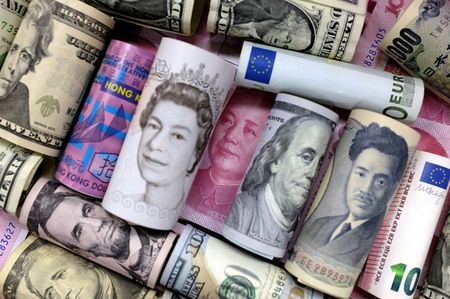 1
1 1
1

LONDON (Reuters) – The dollar strengthened as oil prices steadied, commodity currencies pulled back from some of their recent gains and the Japanese yen sunk to its lowest since 2015.
Equity markets were volatile, struggling to make gains in the Asian session, after more hawkish comments from the U.S. Federal Reserve made investors more cautious.
Fed policymakers signalled on Wednesday that they could take more aggressive action to bring down inflation, including a possible half-percentage-point interest rate hike at the next policy meeting in May.
The Japanese yen fell against the U.S. dollar for the fifth session in a row, hitting its lowest since 2015 with the Bank of Japan expected to lag policy tightening by other major central banks.
“The sharp hawkish repricing of Fed rate hike expectations has mainly benefited the U.S. dollar against low yielding currencies whose own domestic central banks are expected to lag well behind the Fed in tightening policy,” MUFG currency analyst Lee Hardman wrote in a note to clients.
At 0825 GMT, the dollar was up 0.3% on the day versus the yen, at 121.52.
Versus a basket of currencies, the dollar was up 0.2%, trading within recent ranges.
U.S. President Joe Biden landed in Brussels, amid a dispute with European allies over whether to impose further energy sanctions on Russia. Biden will attend an emergency NATO summit, meet with G7 leaders and address leaders of the European Union, with markets on the lookout for any escalation of sanctions on Russia.
In the latest jolt to global energy markets, Russian President Vladimir Putin said that it would soon require “unfriendly” countries to pay for their fuel in Russia’s currency, the rouble.
“The announcement highlights the ongoing risk of further disruption for European economies from the Ukraine conflict,” said MUFG’s Lee Hardman.
“A more prolonged conflict would weigh more heavily on European currencies.”
The euro was down 0.1% on the day at $1.0993.
Business activity across Germany’s private sector dipped in March as output price inflation hit a new record high and the war in Ukraine impacted demand as well as supply chains, a survey showed.
The euro was up 0.1% against the Swiss franc at 1.02575, with the Swiss unit having shown little reaction to the Swiss National Bank keeping its policy rate at -0.75%, bucking the trend of other central banks which have started hiking interest rates to tackle rising inflation.
The SNB said that the franc remains highly valued and that it will remain active in foreign exchange markets as necessary.
Commodity currencies slipped, with the Australian dollar down 0.3% on the day at $0.7481. The New Zealand dollar was down 0.3% at $0.69535.
Bitcoin was broadly steady, around $43,100.
(Reporting by Elizabeth Howcroft; Editing by Emelia Sithole-Matarise)